Opinion: Voices in Decision-Making
Opinion: Voices in Decision-Making
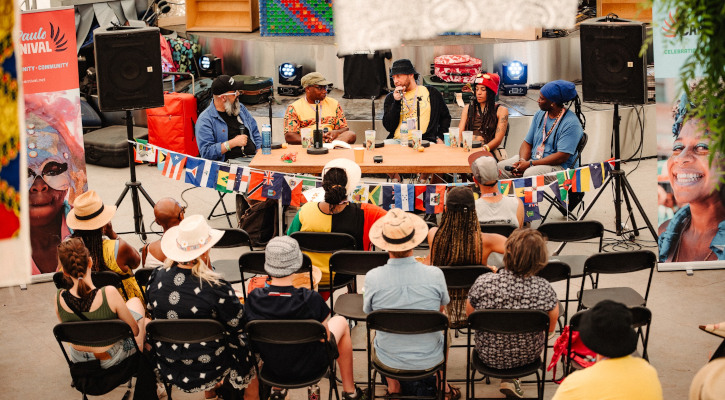
St Pauls Carnival Panel Discussion at Glastonbury Festival 2024 - Image Credit: Khali Ackford
Trinity is committed to creating ways in which citizens can take an active role in shaping arts and culture. As part of this commitment we are connecting with leading voices in the cultural sector to ask them to share their thoughts on the different civic and democratic tools that we as citizens can access. In the second in our series of opinion pieces exploring civic participation LaToyah McAllister-Jones, Executive Director of St Pauls Carnival, reflects on her experiences of using various tools to facilitate democratic decision-making.
Opinion: Voices in Decision-Making, LaToyah McAllister-Jones
I have always been attracted to work and play that enables people to have a voice. To be heard. After years of working with marginalised groups, from managing accommodation services for street homeless people to community organising in Hackney, I have developed an interest in the right to influence decisions being made about our lives.
One of the most interesting things about leading a community arts organisation is just how integral the community is to our work. St Pauls Carnival CIC is merely a custodian for the iconic event; we provide a stage and the community fills those spaces. Carnival celebrates African Caribbean talent in St Pauls and beyond as well as our culture and heritage. Our communities continue the traditions of our ancestors using music, dance and storytelling to share lived experiences and connect to our heritage. This is one of the most important things about our event: it allows us to tell our own stories, in our own words, using our voices.
In 2021, I was asked by Involve to facilitate Bristol City Council's Citizens’ Assembly supporting policy development in housing, health inequalities and transport as the city emerged from Covid. The process was new to me, and I loved the way it cut through many of the challenges that we often come up against when engaging communities:
- Participants are randomly selected, and usually aren’t experts in the central assembly topic. There is a process to ensure that all participants are able to meaningfully contribute to the discussions, and this is critical to the success of an assembly.
- The process seeks to facilitate consensus, rather than debate which tends to have a winner and a loser.
- Participants are encouraged to explore what their real priorities are and what they might be prepared to forego for those priorities.
- Assemblies bring together a diverse range of people who you wouldn’t necessarily find together in a traditional social setting. This creates an opportunity for vastly differing viewpoints to be heard and influence how others participants might think about a topic.
St Pauls Carnival are currently delivering a Citizens’ Assembly for Culture in partnership with Trinity Community Arts, Citizens In Power and West Of England Combined Authority. The idea developed just as we were coming out of the pandemic and thinking about the lessons learnt; particularly the role of community. Together, we were curious about what it would look like to use the assembly process - democratic, person-centred and thinking about strengths of a place, its people and its assets - to reimagine what the cultural offer could look like in the South West region.
Democratic decision-making allows citizens to actively contribute to the discourse that shapes their communities. We also believe culture is experienced by everyone, in many different ways, and everyone should be able to access the culture that represents them. If this is to be the ambition, it is vital that we put people at the centre of that process. This means understanding how people experience culture, what it means to them and, as cultural leaders, asking ‘how can we reflect this in our approach and programming?’
The new Labour Government expressed an interest in the use of Citizens’ Assemblies earlier this year, and the format has been used to unpack challenging issues like abortion in Ireland. The South West region is already embedding this approach into how we speak to our communities, and we are at the forefront of using assemblies to understand how we deliver for everyone, and not just those who can afford it or who have easy access to culture.
Our Citizens’ Assembly for Culture project offers an exciting opportunity to create a new approach to engaging people in the cultural life of a place. The Assembly will take place in Spring 2025 as a central programme within Culture West, funded by the West of England Combined Authority and Arts Council South West. The recommendations coming from this Assembly will become part of the regional approach to delivering a citizen-led cultural offer.
Find out more about the Citizens' Assembly for Culture project:
- Read the first piece in this series about civic participation: Edson Burton’s exploration of why voting matters
- Sign up to an online information session with the Citizens' Assembly team
- Email Imogen@trinitybristol.org.uk to join our Citizens For Culture mailing list
- Read our blogs to find out more about the Citizens' Assembly project
Empowering young people through art
Empowering young people through art
Film by Latent Pictures
In September 2024 we will launch the ‘Cultural Alliance’, a two-year tailored arts-based learning programme delivered in partnership with three inner-city primary schools, Easton CE Primary, St Nicholas of Tolentine and Hannah More Primary. This new programme, funded by Paul Hamlyn Foundation, is a first of its kind in the local area and has been co-designed to meet the needs of each school.
The primary schools in the Alliance are based within a half-mile radius of the Trinity Centre with many of the children who attend facing challenges due to health, learning needs, and socioeconomic factors.
Aligning with Trinity’s long-term commitment to combat inequality through the arts, the Alliance will utilise a tailored arts-based curriculum focused on dance and drama in partnership with locally rooted creative partners ACTA and Movema. By addressing the detrimental effects of limited arts-education, the ambition is to support children's overall development and empower them to thrive in their learning journey. Alongside the programme, teachers will be offered ongoing support in their practice, offering them the creative tools and resources to provide the best opportunities for each student to flourish within their unique situations and learning environments.
“The Cultural Alliance will allow children across our local community to connect and learn through creativity. We are looking forward to working with our partner primary schools to inspire creative thinking and allowing each child who participates to thrive” Jenny Bodnarchuk, Youth Service Manager
The Alliance has been shaped through extensive consultation with primary school pupils, teachers, governors and community organisations, conducted by Trinity since 2021. These consultations highlighted the urgency of embracing alternative measures of academic success - considering their pupils’ diverse linguistic, cultural, and socio-economic backgrounds - and reported the need for new tools and practices to build trust and foster inclusivity.
The Alliance takes an investigative approach, incorporating tailored collaboration with each school, responsive to their unique needs. By integrating arts-based learning, teacher support, and initiatives addressing inclusion, the Alliance will create a transformative educational experience for educators and pupils, fostering a more inclusive and equitable learning environment.
The Alliance has been developed via initial seed funding from Van Neste Foundation and Nisbet Trust secured in 2023 to test and refine the programme through free-to-access arts-based provision for primary-aged children that included Forest School activities as well as embedding a dance programme, World in a Box, in partner schools.
Building on learning from these pilot activities, the launch of the Cultural Alliance in September 2024 has now been made possible through a two-year grant from Paul Hamlyn Foundation marking a significant step forward in local investment in children's access to arts and culture.
Find out more about our Children and Young People's programme here.

Thank you Bristol
Thank you Bristol
Old Market Protest 07/08/24
The past few weeks have been deeply distressing, particularly for our Global Majority staff and Centre users and it was disheartening to see Old Market boarded up out of fear of hate.
After careful consideration our staff, security, event organisers and community reps made a difficult last-minute decision to close during the protest. This was a tough call, as we had to balance our collective desire to stand defiantly against racism with the need to protect those who might be targeted by the threats of violence.
It has been reaffirming to see the people of Bristol come together to stand up against racism. The cross-sector effort that quickly created the conditions for a safe counter-demonstration to take place has personally given me hope to keep move forward with purpose in pursuit of our charitable mission and values.
In this time of heightened emotion, please make space for complicated feelings to be processed in imperfect ways, and be kind and forgiving to yourselves and one another.
Emma, CEO
Make space to process...
There are a number of agencies across the city that can offer resources, support and advice:
Bristol Somali Resource Centre provides free and impartial information, advice and guidance 0117 907 7994
Nilaari Agency Black-led charity dedicated to providing mental health assistance, particularly to adults from Black, Asian, and Minoritized Communities - call 0117 952 5742
Samaritans offer support 24 hours a day, seven days a week - freephone 116 123
Avon & Wiltshire mental health partnership offer mental health support, advice and guidance
Shout offers confidential text support 24/7 - text SHOUT to 85258
Staying safe & vigilant
SARI - Stand Against Racism & Inequality have prepared some resources on what you can do if you encounter or witness a hate crime.
Connect & celebrate...
Although Dionne's Speakeasy couldn't go ahead this week, we’ll be out to show our support next week. All are welcome—please spread the word!
Opinion: It's time to curate a different way of being
Opinion: It's time to curate a different way of being
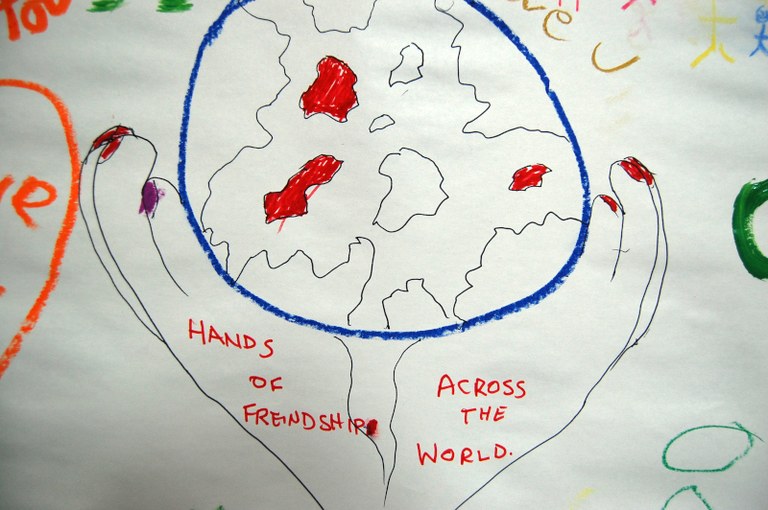
At Trinity, families from across our surrounding neighbourhoods come together. Children create paintings reflecting their diverse heritages. They sing nursery rhymes in different languages. The UK I see each day is not the divided one that manifested this weekend. It’s a place where people connect and foster relationships, bridging our diverse pasts within our shared present.
To suggest multiculturalism is something we tried and can simply undo is a particular form of dishonesty. Whether you like it or not, our towns and cities will only become more diverse so we must find ways to rub up against each other in less painful ways.
Multiculturalism isn’t a problem, but it’s also not a Benetton ad. Trinity’s charitable purpose is to promote racial harmony by encouraging equality of opportunity and good relations between people of different racial and cultural identities, and by facilitating multicultural activities. This isn’t just because it’s great fun, but because cohesion isn’t incidental. It requires work, spaces and resources, which are in short supply as counties, councils and communities go broke.
As the world changes around us in quicker and bolder ways, demographic profiles will continue to shift. Connecting online or in spaces with those who only nod in agreement makes seeing the world through a different lens all the harder.
Anchor hubs, community halls, neighbourhood pubs, historical sites and cultural institutions can offer an antidote; providing a familiar backdrop for existing communities while welcoming new ones. But rapid redevelopment, rising costs and pressures on sustaining statutory services are placing pressures on councils – often the legacy owners of a portfolio of our civic, cultural and heritage assets – to sell off the spaces that underpin our social fabric. Meanwhile, the decline of high streets has slowed growth and depleted local offerings that were once the foundation of an area’s cultural identity. If we no longer have places to drink tea and eat biscuits together, this creates a feeling of loss and defensiveness of 'us' that compounds fears of 'them'.
The sleight of hand being played is, while attention is diverted to small boats, the real threat – unregulated speculative land investment and inadequate community land control – continues to rob us of what’s ours. The response is a growing movement of local and national networks battling to save our spaces. While there are success stories, many of these campaigns struggle due to a lack of resources, experience and long-term support. Cash talks meaning it can be difficult to compete against the pressure on local authorities to dispose of assets at a commercial rate to balance budgets. Unlocking decisions and funding to protect these assets often hinges on political cycles, party policies and slogans that feel beyond our influence. This means, for every success story, we’re still losing more than we’re saving.
If we want to make things better for everyone, we must find a way to value societal well-being and sustainable development as much as, if not more than, the economic value of the ground under our feet. We can call in the army, increase police resources and regulate online spaces. But, if we want to see less of what happened this weekend, we must engage in the national conversation about the systemic issues behind such events and address how we provide vital civic infrastructure for a population that will only continue to grow in density and diversity.
The decisions we make now shape the story we tell about ourselves to future generations. At Trinity, we push the boundaries of a building constructed by people who could never have imagined the ways we use the space today. This space, built without us in mind, requires us to find ways to resource it for the future while accepting that we can’t predict what tomorrow holds or control who gets to be part of that.
Communities, times and places change. Once disparate cultural threads intertwine, shaping the ancestors we become. The fringe becomes the ordinary, the dinosaur, the dust. In a world of polarisation, fear, and uncertainty, these are the spaces (as our Edson says) that allow us to curate a different way of being, resonating with our shared past and shaping a more resilient and culturally vibrant future.
Right now, these spaces are more vital than ever.
#RadicalInclusion
This is an opinion piece by Emma Harvey
In Conversation: Mungo's Hi Fi
In Conversation: Mungo's Hi Fi
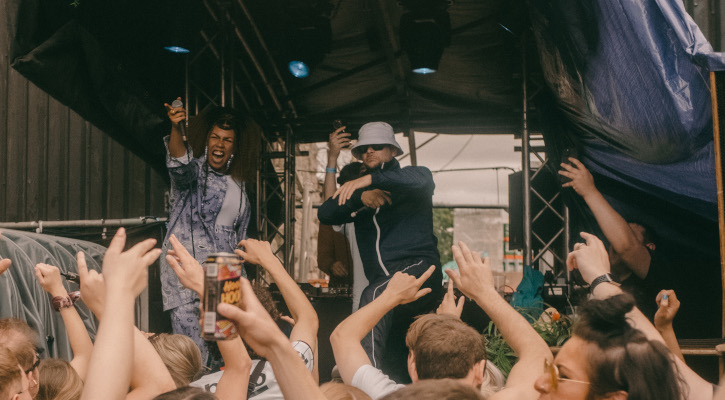
Mungo's Hi Fi performing at Sequences Festival with Eva Lazarus and Charlie Hands
We are working with Bristol-based external promoters and artists to platform local grassroots artists alongside internationally renowned musicians. Teachings in Dub have been a staple of Trinity's programme for the last 15 years, honouring Trinity's legacy as a soundsystem venue by bringing some of the best Dub soundsystem operators and MCs to Trinity with monthly events at The Trinity Centre.
Ahead of our Day Party with Teachings in Dub and Mungo's Hi Fi on Sunday 18 August, we sat down with Mungo's to chat soundsystems, summer plans, up-and-coming artists and much more.
Q: Hi! Can you introduce yourself and tell us a little about how Mungo’s Hi Fi formed?
A: Hello - we are Mungo's Hi Fi, a Soundsystem based in Glasgow and named after Glasgow's founder, St Mungo. We started collecting vinyl, playing out, organising club nights, free parties and protests in the 90s. We saw the music as part of a social movement, and developed a DIY culture around what we did, starting to build our own soundsystem at the time.
"Bristol is the capital for UK soundsystem culture at the moment, fed by the deep enthusiasm for the festival and party scene, far enough away from London to have it's own scene, but still close enough to be involved with what's going on there" - Mungo's Hi Fi
Q: Your soundsystem is pretty legendary – can you tell us how it was developed?
A: We helped out with other people's sounds to begin with, and then found some old speaker boxes discarded in a skip. We bought an old amp, fixed them up and started building from there. We had a monthly gig in a bar which we took the sound to and played music at, as well as our own promotions in an old working man's club. We used the money from these events to pump back into buying more and better speakers and amps, as well as building speakers ourselves, some of which we are still using nearly 20 years on. It has improved over the years, and we have become more experienced in every aspect of using it.
Q: How did you first link up with Stryda and Teachings in Dub?
A: I am ashamed to say I can't remember. We used to listen to their radio show and they helped promote the releases we were putting out since we founded Scotch Bonnet in 2005...so we have been in touch for around 20 years. They have always been supportive of what we do, and vice versa.
Q: You’ve been a staple of Bristol lineups for some time now – is there anything about Bristol that sets it out from other cities in terms of Soundsystem culture?
A: Bristol is the capital for UK soundsystem culture at the moment, fed by the deep enthusiasm for the festival and party scene, far enough away from London to have it's own scene, but still close enough to be involved with what's going on there.
Q: What else does the summer have in store for Mungo’s?
A: This summer is pretty crazy for gigs. It started off with tours in Australia, New Zealand, America and Canada, and since then has been a whirlwind of festivals in the UK and Europe, from Latvia and Croatia, to the depths of the Scottish countryside. It is such a privilege to be invited to these sacred gatherings of various tribes. Got to say Boomtown will be a highlight this year with our first ever soundclash with David Rodigan.
Q: Who are some reggae and dub artists you think more people should know about?
A: Tough question, which depends on how much your ear is already to the ground. Coming from Jamaica right now you have to rate Samori I and Lila Ike as bringing something fresh and exciting. I'm a big fan of Johnny Go Figure from New York who I met for the first time a couple of weeks ago. As for the UK, I love what Joe Yorke is doing right now.
Q: Anything else you’d like to add?
A: I'm really keen to find out what the next generation will bring, and to see if there are ways that those of us who have been through it all can support them, cos I know it's harder than ever to make a name for yourself, let alone a career in the music industry. We help run a project in Scotland called The Soundsystem Project where we share some of the skills we have learned in building speakers, DJing, song writing, production and everything around that with young people. It really feeds my soul to see fresh faces getting involved, feeling inspired and growing as individuals and groups through the joyful act of making music together.
Mungo's Hi Fi will be playing at our Day Party with Teachings in Dub on Sunday 18 Aug alongside Solo Banton, Housewife's Choice and more - click here to get your tickets.
Look Back: Nature in Newtown
Look Back: Nature in Newtown
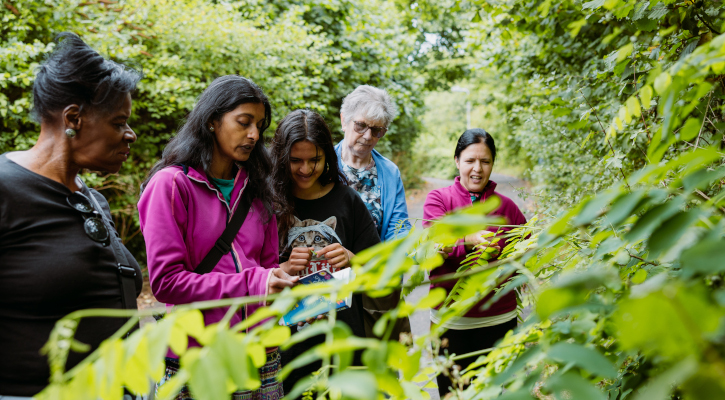
Nature in Newtown - Image Credit: Alastair Brookes
Throughout the summer, we’ve been working with our Community Connectors to programme activities for the local community. Working with Shanti Pant, our Community Connector for Newtown, we devised a programme that encouraged residents local to Newtown to spend time together, enjoying and learning about local green spaces through gentle exercise and nature walks.
“You just don’t know what is on your doorstep” - Feedback, Nature in Newtown Participant
Newtown is one of three local neighbourhoods that Trinity is working closely with over the course of this year, to develop a greater understanding of residents’ interests and experiences, and how we can offer support to share creative activity. As a Newtown resident, and nature-lover, Shanti was keen to share her experience of how spending time in nature can provide a simple way to support wellbeing and connect with others, so we worked with her to create this project.
Nature in Newtown ran for ten weeks from June - August, led by Subitha Baghirathan, and supported by Shanti. With Lawrence Hill Health Centre as the groups’ meeting point, Subitha shared a range of wellbeing exercises and activities for participants to experience including; tai chi, vagus nerve breathing, mindfulness activities and listening walks. Through rain and shine, we welcomed ten local people over the weeks, enthusiastically sharing their knowledge of the area, and learning new things from each other.
We found out that there is plenty of nature surrounding Newtown, and new places to discover too. A walk through some tunnels - shared by one member of the group - contained beautiful tiles documenting ‘The Industries and Crafts of Bristol’s Rich Industrial Heritage’, a walk along the railway path encouraged group members to use Subitha’s tree book to identify different species by their leaves, and a visit to Trinity’s garden enabled the group to meet Fleur, our garden project facilitator, who showed them around the space and talked about our volunteer programme.
Over the weeks, participants reported an increased feeling of connectedness to their local community, confidence to explore the local area, and confidence to engage with others.
For the second part of this project, we’re inviting practitioners Shanti Sherson (Wellbeing at Wellspring Settlement) and Jon Aitken (filmmaker at Watershed) to join us at Lawrence Hill Health Centre’s community garden, for Filmmaking in Newtown.
Over three sessions in September, Shanti and Jon will lead nature-based activities and help participants create simple short films together that document our connection to nature.
Guitar donated to music-making programme
Guitar donated to music-making programme
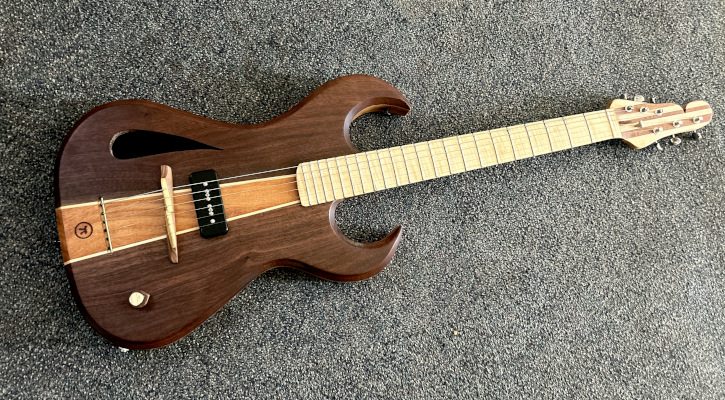
The hand-crafted guitar built by young people who attend Novalis Trust, a Stroud-based learning academy
Young people from Novalis Trust have generously donated a handmade guitar to Trinity's music-making program. This guitar was created as part of the Workbench Project, an initiative delivered in partnership with Pi Guitars.
"We are honoured to donate this guitar to Trinity Community Arts. May it inspire creativity, foster community, and bring the joy of music to all who play it. Thank you for the incredible work you do in Bristol, nurturing the arts and empowering individuals." - James Mountjoy, Novalis Trust
The guitar will be available for young people who attend music making sessions at Trinity to access and play as part of 1-2-1 sessions or the weekly drop in music-making sessions Next Gen Sounds.
The Workbench Project involves young people at the Stroud-based college, who visited Trinity last week to present the guitar to the Music Team. In addition to the donation, the young people enjoyed a tour of Trinity's facilities, including the Recording Studio and the Live Room. Novalis Trust is a Stroud based charity who operate multiple residential facilities in aid of people with learning difficulties from the age of 7 all the way up to 65.
James Mountjoy - a Senior Occupational Therapist from Novalis - said that the group wanted to donate their guitar to Trinity as they love the work we do with Young People in the Creative Arts, reaching so many people to bring them opportunities to explore their creativity, much like the work done at Novalis and Pi Guitars.
Click here to find out more about Trinity's programme of events and activities for Children, Young People and Families.
Bringing Dance Back to Bristol Harbour Festival
Bringing Dance Back to Bristol Harbour Festival
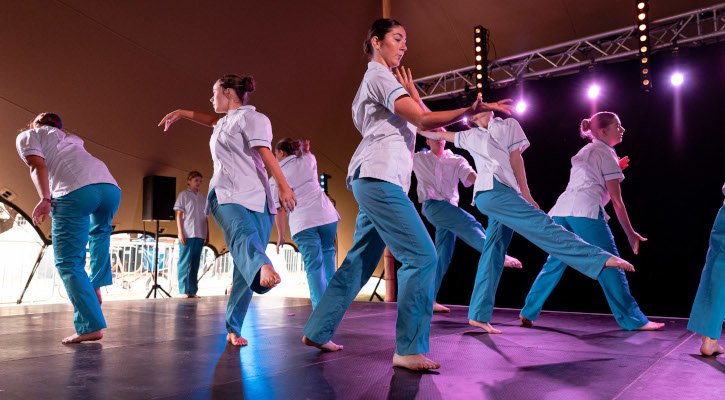
Bristol Harbour Festival 2024 - Image Credit: Amy Fern
We were delighted to be welcomed back to programme the vibrant dance stage at this year's Bristol Harbour Festival - one of the biggest events in the city welcoming over 250,000 visitors across the weekend.
'This cocreated dance piece has been a wonderful creative project that brought dancers together from different backgrounds from across Bristol to create a unique, emotive piece' - Penny Marie, Dance Workshop Facilitator
Taking over the stage in Queens Square, we platformed a huge range of dance styles and traditions present in Bristol’s dance community; from Indian to Irish Dance, Voguing to Turkish Belly Dancing.
Some highlights from the weekend included Anna K, Bristol Ballroom Community, D-Wild Fitness and RSVP Drummers. We also platformed established resident dance groups based at The Trinity Centre, such as Gerry’s Attic, a dance group for older people who rehearse at Trinity every week.
In the lead-up to Bristol Harbour Festival, we commissioned Dance Facilitator, Penny Marie, to lead a series of participatory dance workshops in which attendees co-created a new dance piece to be performed at the festival. Across five workshops dancers of all abilities and backgrounds collectively devised a 15 minute dance piece entitled 'Our Light Within' that they performed on the Saturday of the festival.
Alongside this, HYPE Dance, who offer weekly street dance sessions at Trinity, hosted the Ultimate Dance Championships 2024 – a competition open to all dance styles for ages 12 and above. Winners of this competition showcased their dancing skills in front of the Harbour Festival audience and a panel of judges that included professional dancers Bethany Kyle, Tesleem Adeyemi and Candice Scott. Alongside this, HYPE brought performances from Lil Hype, Hype Dance and Hype Carnival Squad.
We wanted to say a massive thank you to everyone who made the takeover at Bristol Harbour Festival 2024 such a success; from the facilitators, the talented dancers, the technical team behind-the-scenes, our partners Movema, Gerry’s Attic and HYPE Dance, and of course to everyone who came along to watch the performances and support dance in Bristol.
Programming the Dance Stage is one of the many ways we are creating pathways for communities to connect and celebrate together though culture. Click here to find out more.
Tonic Music partnership
Tonic Music partnership
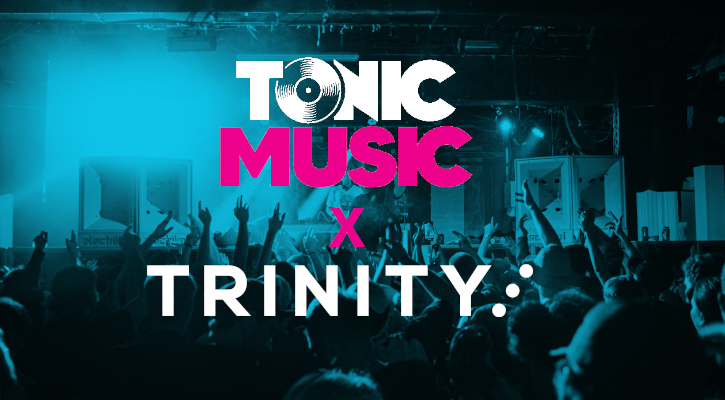
We are committed to championing the positive benefits of music and arts on both mental and physical health, so we are delighted to work in partnership with Tonic Music to offer mental health signposting and advice support for audiences and artists as part of our in-house programme, Trinity Presents.
"Tonic Music are delighted to be partnering with Trinity to provide mental health support for music communities in Bristol and the surrounding areas. We look forward to starting this exciting partnership work."- Jeordie Shenton, Tonic Music, Programmes Lead
Through their Tonic Rider programme, Tonic Music will have an information stall at several up-coming Trinity Presents shows, offering a space for audiences and artists to find out more about the work they do and get access to the services they provide. The Tonic Music team includes qualified mental health practitioners, each with significant experience participating in music as an occupation.
Tonic Music is a registered charity with the aim of establishing good mental health within music communities, by providing accessible programmes of mental health support tailored for the music industry (Tonic Rider), music fans (Never Mind The Stigma) and music youth (Tonic Futures).
Tonic Music will be present at the following upcoming shows:
- 18/08: Trinity X Teachings in Dub day party with Mungo's Hi Fi
- 13/09: Bethany Ley EP Launch
- 22/09: Garden Party: Community Celebration
- 24/10: Ishmael Ensemble
Free activities in Old Market
Free activities in Old Market
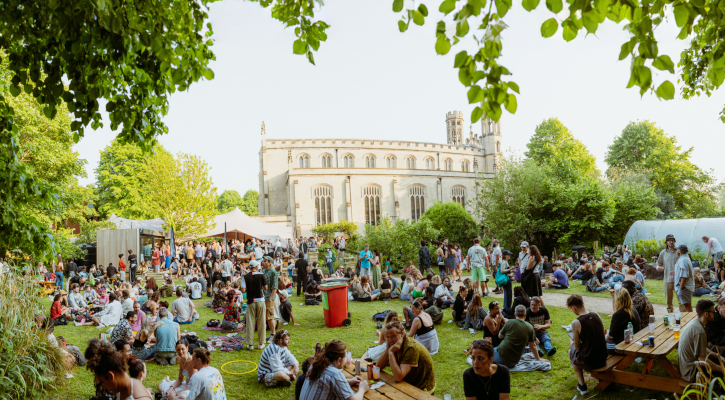
Trinity Garden Party 2024 - Image Credit: Alastair Brookes
We are very happy to announce we are one of three organisations to be awarded funding to deliver free culture and events activities in the city centre, between summer 2024 and February 2025.
“We are absolutely thrilled to receive this grant and to be recognised as the anchor organisation to bring together the diverse communities that make Old Market such a vibrant neighbourhood to visit, live and work in” - Jen Farmer, Arts Engagement Manager, Trinity Community Arts
Compass Presents, The Invisible Circus and Trinity Community Arts have each received £40,000 of funding from Bristol City Council to be the lead organisations to produce and manage activities in three areas of the city centre: Christmas Steps, Old Market and Stokes Croft.
This grant highlights the focus of our work over the last few years to proactively connect and engage with our hyper-local communities in arts and cultural activities, alongside our live events programme that boosts the local economy. With this grant we can build on our reputation producing high quality arts activities by co-designing an exciting and meaningful programme in partnership with our trusted local partners bringing together artists, residents and small businesses to maximise our collective potential.
The ongoing aim of the programme is to attract more people into the city centre to help support the local economy, businesses and the culture and events sector by showcasing Bristol’s reputation for creativity and arts.
We will be announcing more details about the events in the coming weeks.
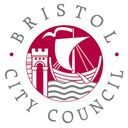
Miriam Margolyes Visits Jacobs Wells
Miriam Margolyes Visits Jacobs Wells
Acclaimed actress Miriam Margolyes took time out of her busy tour schedule to visit Jacobs Wells Baths, showing her support for the ongoing recovery efforts of this historic building. As an early supporter of the campaign, and a patron of Trinity Community Arts, Miriam's visit highlights the importance of restoring Jacobs Wells as a vital community and cultural heritage hub.
“I’m thrilled to have a chance to visit Jacob’s Wells Baths and encourage the Council and my fellow-supporters with their exciting plans to return this listed building to the service of the local Community. This will help so many to have a go - opportunity knocks at last.” Miriam Margolyes
During her visit, Miriam Margolyes met with our team and some of the professional team from PH3 Design who have developed the recently approved planning scheme to restore the space. Planned works include a street-facing main entrance and modernisation of the previously unused ground floor Pump Room, transforming it into a new cafe-bar and studio.
Miriam's visit comes as we complete key milestones for the project, including securing planning and lease completion. This means we can now begin crucial Phase 1 Repairs including works to the main hall roof, funded by £1.6 million secured from the DLUHC Community Ownership Fund and match funders.
We are excited to now be able to move forward with our efforts to bring the building back into use as a multidisciplinary venue for arts, heritage, youth, community and educational use.
We want to give thanks to everyone who has so far shared in our journey to make this vision possible, including our Patron Miriam, Bristol City Council, local stakeholders and the Hotwells & Harbourside Community Association, who led campaign efforts to save the building from disposal.
Completion of the 35-year leasehold is still to be confirmed by asset owners, Bristol City Council.
Find out more about our Jacobs Wells mission:
- Discover our vision for the building to be restored and reopened
- Learn about our Community Asset Transfer offer by Bristol City Council
- Donate to our Fundsurfer to help raise much needed funds for our phased plans to restore the building
Oh Miriam! Live is at Bristol Beacon, 12th July – Click here for tickets
In Conversation: Anjali Prashar-Savoie
In Conversation: Anjali Prashar-Savoie
In partnership with St Pauls Carnival, Citizens In Power and West of England Combined Authority we are delivering a Citizens’ Assembly for Culture in 2025.
This ground-breaking initiative will bring together people from across the region, to meet with creative practitioners, cultural providers and decision-makers to shape the future of a cultural delivery plan for the region.
We have recently recruited Anjali Prashar-Savoie as the Citizens’ Assembly Producer to help with the successful delivery of the Assembly. We caught up with her to find out more about the project that will take place in 2025.
Q: Hello Anjali! Can you tell us a bit about yourself and how you’ve come to be the producer of the Citizens’ Assembly.
A: I've been working in the cultural sector and in nightlife with a focus on grassroots culture, community organising, and creating spaces that prioritise people, equity, and access. I'm really passionate about how culture can drive new forms of social and civic participation, especially given the current political, environmental, and social challenges that we collectively face.
This experience led me to the Citizens’ Assembly Producer role. I'm grateful to contribute to something that represents the kind of systemic change we need in both culture and society as a whole. Often, we know what challenges we face in culture and beyond, but practical moves towards solutions can be difficult to organise at scale. The Citizens’ Assembly stood out to me because it offered a practical model for doing culture differently.
Q: What has your experience been of the job so far?
So far, I've been connecting with cultural workers, organisations, and grassroots organisers to get people involved in the project and understand how Citizens' Assemblies can be useful. I'm also working on expanding a wider Citizens for Culture network to make sure that the Assembly is shaped by the people it serves.
Q: You’re currently working on connecting with other cultural organisations and individuals in the region over Citizens For Culture. Why would you encourage people in the cultural sector to get involved with the project?
The sector is filled with incredible talent and group efforts that make for an exciting and diverse culture. However, sometimes the work on the ground doesn't trickle upwards into decision-making and policy. On top of that, a lot of the cultural sector is made up of freelancers who work somewhat disconnected from each other, meaning we work in silos.
Engaging with Citizens for Culture will connect people interested in citizen or community-led culture. This means you can expand your network, share information, skills, and resources, participate in upcoming workshops, and contribute to collective advocacy efforts to influence policies and secure better support for culture in the region. It provides an opportunity to build meaningful relationships with citizens and other cultural workers, creating a collaborative community with shared goals of doing things differently.
Citizens for Culture also connects you with the Citizens’ Assembly set to happen early next year. We are looking for people in the cultural sector to become associates of the assembly and help guide what happens next. By engaging with this project, together, we can make sure your voice is amplified to shape the Assembly, and that the outcomes of the assembly are supported. Overall, this is a region-wide collaborative project that is worth being a part of because the process and outcomes will be determined by the people who join.
Q: Anything else you would like to add?
We are offering online information sessions over the summer to learn more. The sessions will cover what a citizens’ assembly is and how you can get involved. In these sessions, we will also be seeking your input into our upcoming workshop series that will run throughout the Autumn.
Additionally, I love to chat. If you are a creative, cultural worker, venue, organisation or community organiser in the region, I would love to hear from you. Please feel free to reach out to me directly to chat about all things culture, community and citizens' assembly.
Find out more about the Citizens' Assembly for Culture project:
- Sign up to an online information session with the Citizens' Assembly team
-
Email Imogen@trinitybristol.org.uk to join our Citizens For Culture mailing list
-
Read Edson Burton’s opinion piece of why voting matters in this series about civic participation
-
Read our blogs to find out more about the Citizens' Assembly project
Opinion: Voting matters
Opinion: Voting matters
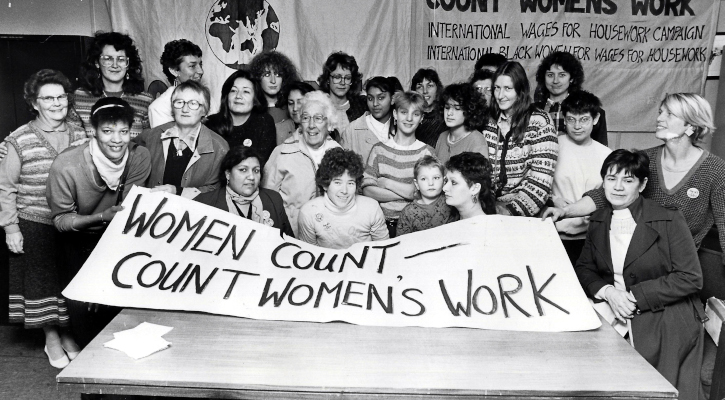
1985 Oct 25 International Time Off for Women Day, credit Evening Post, collected as part of Art of Resistance
Trinity is committed to creating ways in which citizens can take an active role in shaping arts and culture. In 2025 Our Citizens Assembly for Culture, created, in partnership with St Pauls Carnival and Citizens in Power will take place, offering people living in the West of England Combined Authority region the opportunity to actively shape the arts and cultural experiences that matter most to them and their communities.
As part of this commitment we are connecting with leading voices in the cultural sector to ask them to share their thoughts on the different civic and democratic tools that we as citizens can access. In the first in our series of opinion pieces exploring civic participation Dr Edson Burton, Curator at Trinity, reflects on the role of voting in democratic decision making.
"The Bristol Bus Boycott, the Gay Rights Movement, the Disability Rights Movements of the 1960s-1990s. These campaigns or movements have led to legislative changes that have, in turn, transformed our social attitudes"
Opinion: Voting Matters, Dr Edson Burton
‘Politics time again, are you gonna vote now?’ lamented the reformed Buju Banton, alluding to the lethal elections of his native Jamaica. But the question could equally be applied to the forthcoming British election. During the last General Election (2019), 67% of the population voted, up from the all-time low of just over 59% in 2001.
While that figure is on the rise, it still means that over 30% of the population has no say in how they are governed. According to a recent YouGov poll, the reasons given for not voting include a lack of access to polling stations, ineligibility, and no forms of ID. However, the most prominent reasons are a lack of trust in politicians and a feeling that voting will make little difference.
One might argue that cynicism is rife in politics, with pledges that are misleading if not downright dishonest. It has ever been thus, but in a crowded information world, voters may become so confused as to become indifferent.
Perhaps the dance of truth owes as much to us as to our politicians. Few would jump for joy at the thought of higher taxes, but without increased taxation, how can we fund our troubled public services, invest in green technology, or ensure education offers opportunities for all?
Responding to concerns over national identity, political parties offer a raft of immigration control measures that, if implemented, would lead to a national staffing crisis. Yet, to extol the virtues of immigration is to risk electoral suicide.
The convergence between the main political parties may also fuel voter apathy. "There's no difference between them" is the often-heard lament. Despite the barbs and bites, there appears, at times, to be more that unites than divides the main parties. They vie to expose the actual commitment to an agreed-upon agenda rather than the agenda itself.
But it is worth remembering that this consensus is the result of political participation. The impetus to secure or woo working-class votes in this election is a result of the extension of the franchise beyond a small property-owning class. Once enfranchised, all parties have had to take seriously the interests of a wider range of citizens with divergent interests and lives. Further franchise expansion was not some benign gift of a ruling class but the result of blood and guts campaigns by working-class men and women. Think Chartists, Unions, the Suffragettes.
What is the point of voting if you cannot meaningfully participate in society? If your race meant you could be legally denied access to jobs or employment? If your gender meant you were denied promotion, let alone equal pay? If your sexuality or sexual identity could lead to your imprisonment?
Such was the case prior to major civil rights campaigns: the Bristol Bus Boycott, the Gay Rights Movement, the Disability Rights Movements of the 1960s-1990s. These campaigns or movements have led to legislative changes that have, in turn, transformed our social attitudes.
Broadly speaking, all our political parties have arrived at baseline of inclusivity consensus. In recognition of new voting demographics and the reputational damage of appearing to be illiberal parties may wish to appear to be race, gender, and disability friendly
But how safe is this consensus? Is it a pragmatic concession to the present while some hanker for an illiberal past? The USA has recently demonstrated the danger of complacency as civil rights advances have been eroded by reactionary forces. Could the same thing happen in England? Perhaps if it is electorally beneficial, but certainly not if it is electorally damaging. It could only be so if we vote or hint that our vote is for the preservation of our rights.
Beyond preserving our rights, further changes that we want to see in society will inevitably involve legislation, which in turn will involve exerting pressure upon politicians. The time scale of change may not suit the urgency of our demands, but rather than lose heart, we must continue to exert political pressure through campaigning and ultimately through the ballot.
Not voting is a verdict on politics, but it cannot lead to change; rather, it will maintain the status quo. In the calculus of win or lose, only voters and their interest's matter.
Vote.
Find out more about movements that have shaped society by exploring our interactive heritage timelines
Black Creatives Network
Black Creatives Network
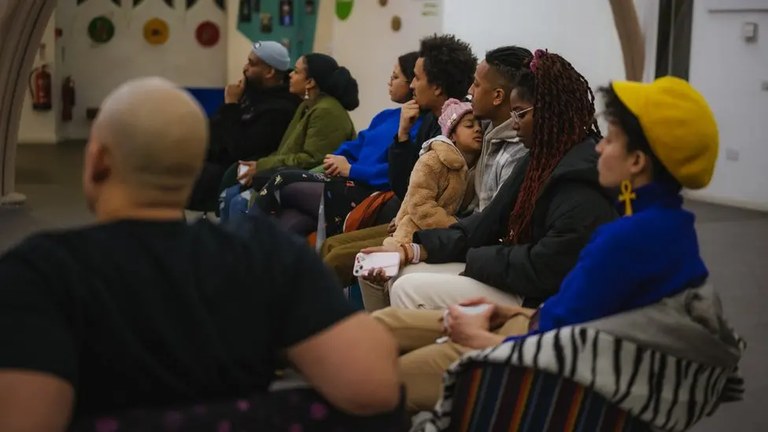
Image by Khali Ackford
Trinity is proud to support the Black Creatives Network, a monthly meet-up designed to provide support, reflection, and opportunities for Black artists across all disciplines.
The Black Creatives Network offers a dedicated space for artists to connect, share experiences, and develop their practice in an environment rooted in community and collaboration. Open to walk-ins, meet-ups take place on the fourth Monday of every month at Trinity.
The journey so far
This initiative, led by Rider Shafique (I-Dentity) and Khali Ackford, emerged from feedback gathered during online workshops delivered as part of Trinity’s community arts project, What I Want To See, What I Want To Be.
The need for greater representation and support for Black artists has been widely discussed, as highlighted in this BBC article, which explores the barriers Black artists face in the creative industries.
The Network has collaborated on projects that amplify Black creative voices. In 2024, members of the network contributed to the New Black Narrative exhibition at the Royal West of England Academy (RWA), in partnership with the Diverse Arts Network. This was a groundbreaking showcase exploring new perspectives in Black contemporary art.
Click here for more info and dates of upcoming meet-ups.
Interested in joining? Just turn up on the day or reach out to jamell@trinitybristol.org.uk for more info.
Vacancy: Bar Staff
Vacancy: Bar Staff
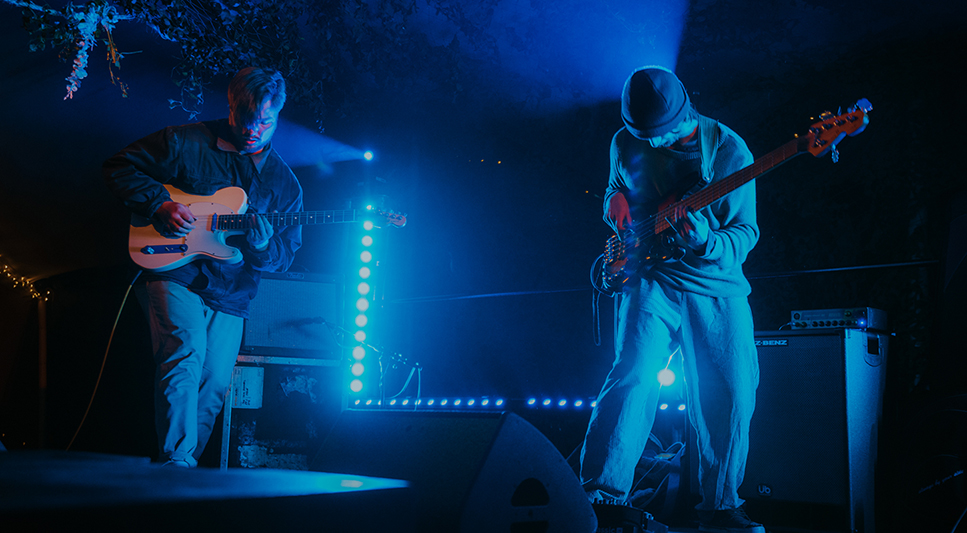
Waldo's Gift performing at Trinity in 2021. Photo Khali Ackford
Casual Bar Staff
£12ph* basic (+10% for anti-social hours), shifts vary
Deadline: Open call
We are looking for casual Bar Staff to join our team in time to help us with the delivery of our varied event programme.
The role will require someone who is willing to work flexibly according to our growing events calendar which includes everything from community meetings and conferences, live performances, club nights and weddings. We are looking for someone who is passionate about people.
How to Apply
- download the job description and person specification
- complete our anonymous online equal opportunities monitoring form - this will not be used as part of the selection process
- send a CV to info@trinitybristol.org.uk with the subject header ‘Casual Bar Staff’
Trinity is an Equal Opportunities employer and actively encourage applications from all backgrounds and communities. We recommended reading the job description and person specification thoroughly and describe exactly how you meet the requirements as this is the basis on which candidates will be shortlisted for interview.
We will make reasonable adjustments to the recruitment process if you have a disability or long-term health condition, or if you need something different or additional as part of the recruitment process. To discuss your requirements, please get in touch on info@trintybristol.org.uk/ 0117 935 1200 or pop into the Trinity Office between 9:30am-4pm Monday-Friday.
Please see our Recruitment Policy for further information.
*Starting rate shown as of July 2024 - rates subject to increase in line with Living Wage Foundation changes
Community Connectors
Community Connectors
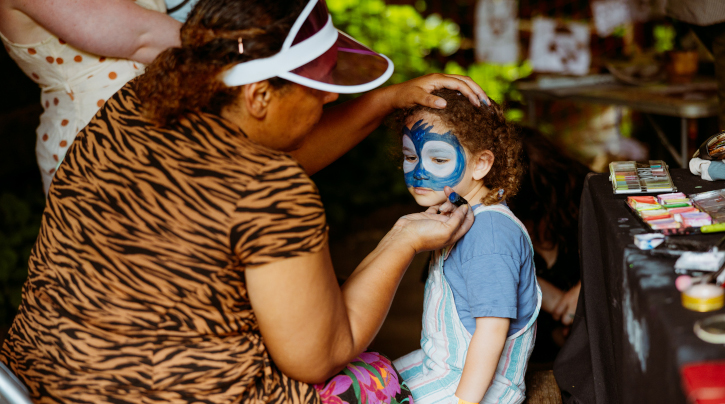
Trinity Garden Party. Photo Alastair Brookes
Over the last year, we have developed our Community and Neighbourhoods programme in response to the needs and interests of residents, community groups, and grassroots organisations.
“I’m really looking forward to connecting with the residents of Newtown. The weekly sessions will be a place where people can share their skills and interests and socialise together” Shanti, Community Connector
We have created three 'Community Connector' roles to connect with communities within the Newtown area, families who live on or near Stapleton Road, and people who access services at the Wild Goose Cafe.
Shanti Pant is the Community Connector for Newtown, a neighbourhood directly opposite the Trinity Centre. As with all the Connectors, Shanti has an active presence in Newtown both as a local resident and in organising community events alongside her daughter, Hemlata.
Originally from Nepal, Shanti has lived in Newtown since 2019. Having grown up in the countryside, she is keen to bring activities to Newtown that connect people to nature and organise weekend events for children and families. A keen craftsperson she wants to use these skills to offer activities for people who may be experiencing loneliness and isolation, providing opportunities to connect through creativity and craft.
In the first few months as a Connector, Shanti has been working with Trinity’s Communities and Neighbourhoods team to plan workshops inviting local residents to join artist Benoit Bennett in designing a mural to celebrate Newtown and the communities who live there. She also attended workshops led by the University of Bristol at their Wellspring Micro-campus in Barton Hill. These workshops explored ways in which older adults can use film as a creative medium – something that Shanti is keen to explore with local Newtown residents.
Alongside this, Shanti has been connecting with residents and community organisations, including Lawrence Hill Health Centre, to create two new free-to-access activities for Newtown residents that will start in June 2024.
Nature in Newtown is a series of weekly nature walks where local residents are invited to explore the area and take part in gentle movement activities. Initially led by facilitator Subitha Baghirathan, the sessions will then move on to exploring how to use simple creative film techniques as a way to capture and express participants’ experiences of engaging with this activity.
Shanti will also be hosting drop-in Coffee Morning sessions in Rosevear House every Friday morning from 10am to midday, starting on 4th June until 5th July. These meetups will include creative activities and the opportunity for residents to connect with each other.
If you are a Newtown resident and you have an idea for creative activities in your community you can speak to Shanti by:
- Attending a coffee morning or joining a nature walk
- Calling Trinity on 0117 935 1200
- Sign up to our mailing list
Community Connectors and our Community and Neighbourhoods programme has been developed in response to our pledges, click here to find out more.
Dance Returns to Bristol Harbour Festival
Dance Returns to Bristol Harbour Festival
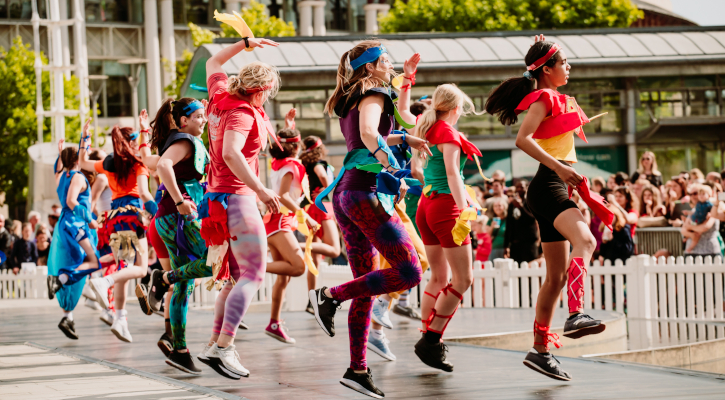
Harbour Festival 2019 - Image Credit: Alastair Brookes
Trinity is commited to creating spaces to celebrate and engage with different types of artforms. This is why we have teamed up with Harbour Festival to bring back the dance stage at this year's festival, programming a stage in Queen Square 20 July.
On Saturday, Trinity will be curating the stage, followed by Movema – an award-winning dance company – taking the reins on Sunday. This year's dance programme is more inclusive and representative than ever before, celebrating Bristol's diverse community through an array of talents and styles.
As always, we'll be collaborating with local dance companies, community groups, independent artists, and cultural organisations to showcase the rich tapestry of dance talent Bristol has to offer. We will also advocate for dance across the city, featuring open access and free-to-attend dance workshops leading up to the festival, ensuring dance is accessible to all.
We are thrilled to announce that Penny Marie will be our dance facilitator for Harbour Festival, working with the community to co-create a dance piece for Bristol through community workshops. Additionally, Trinity residents Hype Dance, an urban dance group for young people, will unveil their Ultimate Dance Championships 2024 – a competition open to all dance styles for ages 12 and above, giving contestants the opportunity to perform in front of a live audience at the Harbour Festival and win exciting prizes!
Our programme boasts an incredible lineup of dance groups, featuring long-time collaborators with Trinity: Gerry's Attic, a regular dance class for over 55s; Anna K, a Turkish belly dancer who led performances and workshops at our Garden Party on 12 May; Bristol Ballroom, a queer-led collective known for their vogue balls at Trinity and previous Harbour Fest performances; and Kennedy Muntanga, a professional dancer presenting his new work ‘Hare and Lion’. We are eager to unite these established partnerships, promote fresh work, and provide a platform for these talented dancers at one of Bristol’s biggest events of the year.
Half term activities
Half term activities
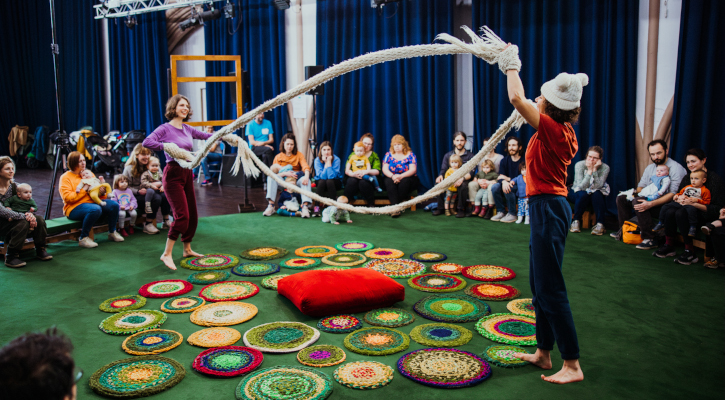
Igloo - Image Credit: Alastair Brookes
This May Half Term, we’ve got an exciting programme of activities and events for children and young people of all ages to get involved with at Trinity.
Wednesday 29 May - Friday 31 May – Speak Out
Our Speak Out workshops continue on Monday, offering young people aged 16-18 free workshops and the chance to create a performance piece with the guidance of Kabbo Ferdinand – an African Indigenousness storyteller and musician, and Natasha Gatward an immersive performance artist and eco-conscious costume designer.
Wednesday 29 May – Music Masterclass: Hodge
Music Masterclasses are back on Wednesday 29th May. This month, young people aged 16-25 are invited to a free production workshop with Bristol-based DJ and Producer Hodge, who will share their approach to producing which involves finding sounds, processing them, and creating loops and ultimately overcoming writer's block while finding methods to create music in an organised way.
Thursday 30 May – Next-Gen Sounds
Next-Gen Sounds continues as normal during the half-term, with young people aged 14-25 invited to Trinity to take part in group drop in music making sessions led by Trinity and Off The Record.
Friday 31 May – Stay and Play
Children aged 0-5 & their families are invited to Trinity to play, learn and have fun together in our Friday Stay and Play sessions, delivered in partnership with the Health Visiting team. Come along to play, sing, share stories and enjoy the beautiful gardens.
Sunday 02 June – The Fairy Forest
Head to Trinity on Sunday to explore a forgotten woodland world, filled with fairies, forest sprites and mystical beings in ‘The Fairy Forest’ a new children’s theatre show from Tidal Tales, suitable for ages 3 and up.
Click here to learn more about our programme of activities for children, young people and families.
Garden Party 2024 Recap
Garden Party 2024 Recap
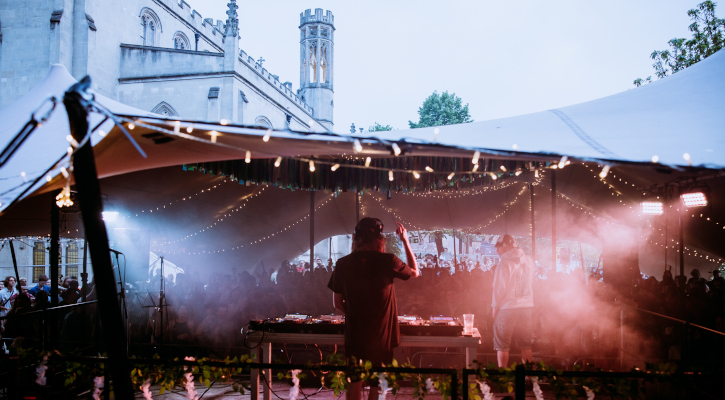
Garden Party 2024 - Image Credit: Alastair Brookes
On Sunday 12 May, we opened our gates once again for Trinity Garden Party – our, free annual day party, celebrating the start of the summer through music, dance and arts.
"It was a fabulous day - thank you to Team Trinity and everyone involved!" - Audience Feedback
In our outdoor venue, The Den, we programmed a diverse range of live music and DJs from across Bristol and The South West. The young musicians from our Next Gen Sounds programme kicked off proceedings, showcasing their musical talents that they’ve honed during the sessions. Following on, we had beautiful acoustic Folk from Eva Penney, groovy Latin rhythms from Los Gusanos, Moroccan Gnawa from Mohammed Errebba, and live Hip Hop from Komposa. Later on in the evening, DJs brought the energy, with an eclectic world music selection from Kesh, amapiano and UK Funky from Josephine Gyasi, and finally Selecta J-Man and Rider Shafique finished things off with a heavy selection of Jungle and Drum and Bass.
Inside, The Main hall was buzzing with performances from our resident dance group Hype Dance, a Turkish Belly Dance circle from Anna K, and finally The Greenbank Ceilidh Collective led the dance with a joyous ceilidh. Upstairs, Fyfe Hall hosted a range of creative craft workshops to keep the young ones busy.
We wanted to say a massive thank you to all who made Garden Party this year such a success; from the talented artists, workshop facilitators, stall-holders, local food vendors, the dedicated sound and lighting team behind the scenes, our hardworking bar staff, the entire Team Trinity, and, of course, all of you who joined us on the day. The event saw our largest ever turnout, with over 3,500 attendees, and thanks to your generosity we raised over £5000 in donations, allowing us to organise more community events like Garden Party as well as supporting our charitable mission of making the arts accessible to all. Garden Party just keeps getting bigger and better, with a 60% increase on last year's attendees, and a 65% increase on last year's donations. Thank you for coming down to support what we do and celebrating music, dance and the arts.
If you'd like to continue to support Trinity, click here to make a donation.
Celebrating local and community history month
Celebrating local and community history month
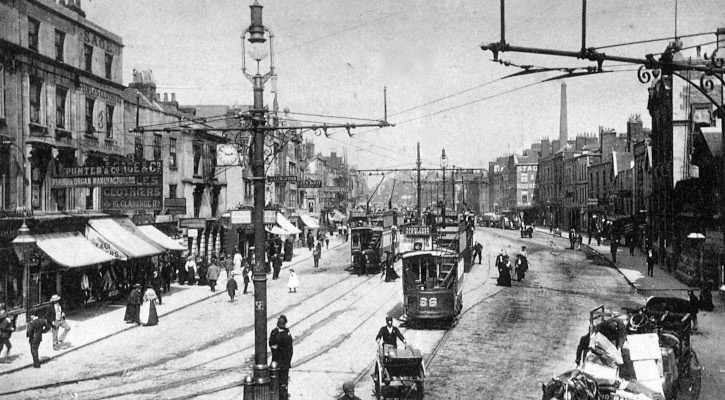
Old Market Bristol
May is Local History month, so to celebrate we’ve been looking back at our heritage project, Vice and Virtue, that documented the rich history of Old Market in East Bristol, where The Trinity Centre calls home.
Early History
Old Market is an ancient marketplace which once stood outside the walls of the Old City and served as a main thoroughfare for goods arriving from London into Bristol.
The area contains some of Bristol’s oldest buildings, with over 60 listed buildings including the Methodist Central Hall, The Palace Hotel, and – of course – Holy Trinity Church, aka The Trinity Centre.
Following the demolition of Bristol Castle in 1656, the area was redeveloped and stone from the castle is said to have been used to repave Old Market Street, with many of the original 17th century building frontages remaining to this day.
Old Market Street was a thriving centre for trade in meat and vegetables, as well as being home to an assortment of small industries specialising in the production of farming utensils, as well as several brewers, maltsters, and public houses.
Industrial Revolution
The Industrial Revolution radically transformed Old Market, with major new businesses attracting workers from across the South West. New opportunities for employment led to East Bristol’s rapid urbanisation during this period. By 1881, the population of St Phillips rose from approximately 8,000 in 1801 to 50,000.
Religion was seen as a major civilising force that followed rapid urbanisation, and as such, many churches were built in these expanding urban areas. One such church was Holy Trinity Church, now The Trinity Centre, which was built between 1829 and 1832 by Thomas Rickman and Henry Hutchinson, two architects from Birmingham and seated 1,500 people.
The new railway added to the hustle and bustle of Old Market. Traffic increased significantly when an electric tramway was introduced in 1876. Unsurprisingly, the street market struggled to coexist with the tram network, and the market ceased to operate during the 19th century, which signalled the start of rapid change in the area.
The Golden Years, 1900-1939
Old Market Street, with its transport links, entertainment centres and range of shops, was an important and vibrant part of Bristol. The first 30 years of the 20th century were marked by a series of bold new development, including The King’s Cinema, The Methodist Central Hall and The Empire Theatre, catering to a new appetite for culture and the arts. While the traditional street market from which Old Market gets its name had faded out during this period, in its place came a range of new stores and retail businesses.
Old Market was part of the ‘golden mile’ of streets that stretched from Lawrence Hill to the City Centre, with a diverse offering of shops attracting visitors from far and wide.
Decline and Rejuvenation
Bristol breathed a sigh of relief after the Second World War, in which the city’s Historic City Centre was decimated during the Bristol Blitz, with Castle and Vine Street being flattened by bombings. However, across the city, including in Old Market, life did not return to normal immediately, with essential food items subject to rationing until 1954.
After the Second World War, Old Market had become increasingly isolated and sidelined. Now Castle Street was no more, Old Market stood on the other side of a bomb site which many Bristolians feared to cross. The electric trams ceased operation in 1941, and by the 1950s, St Philips Station was closed to passengers, further isolating the area.
The bombing of Bristol’s historic centre led to new approaches to housing, in particular high-rise flats of the 1950s, which dramatically changed the face of St Jude’s and Old Market. Old Market also had to compete with the newly built Broadmead shopping centre. The development of the ring road and roundabout as part of the 1966 Development Plan further isolated Old Market from the rest of Central Bristol. Within a dozen years, the ‘high street’ atmosphere of Old Market had all but disappeared, with a dramatic decrease in footfall in the area.
However, the idea that Old Market went into terminal decline after the Ring Road masks a more complex picture. Old Market’s isolation opened a space in which new cultures and subcultures emerged. Since then, Old Market has becoming a bustling centre of nightlife and culture, becoming a home for Bristol’s LGBTQ+ community, alongside a new and diverse offering of restaurants, bars and clubs. With one of the fastest growing populations in Bristol, Old Market’s future seems to be one defined by its eclectic mix of cultures and lifestyles.
Click here to explore Trinity's archives to find out more about the history of The Trinity Centre and Old Market.
This news item is based on information gathered as part of Trinity's Vice and Virtue project.




